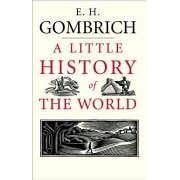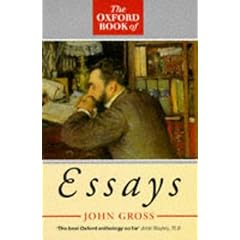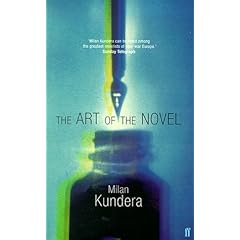Tuesday, August 19, 2008
Ok, so staying with Mary & Greg, my wife's Aunt and Uncle, has allowed me access to a number of fine books. One theme that runs through all of these books is that they contain nothing, formally, that has anything to do with economics (though I cannot help but think economically in the face of some of the ideas, but more on that another time).

E.H. Gombrich's A Little History of The World is meant to be an advanced child's or early teen's book of the history of the world. It has short chapters and covers everything from the rise and fall of Egypt, Greece, Babylon and Rome, to the development of the Arabian empires, to basic Chinese and Eastern History, to the modern age. It is written in such a way as to make it attractive to kids and offers you all kinds of interesting insights - I have kept on coming across several little things about parts of history I had not known. Gombrich is better known as one of the most famous art historians of the C20th (mainly for the publication of his Story of Art), this however was the first book her wrote and published in 1935 immediately after finishing his PhD. It was published in German and was only recently translated by him into English and translated almost entirely by him, however as he died during the translation process he never saw the publication into English. His research assistant completed the job. The only thing for me that was occasionally annoying when reading this was that he was obviously biased positively toward a Judeo-Christian ideology in terms of a 'religious position'.
 The Oxford Book of Essays edited by John Gross is a superb collection of essays from David Hume to John Stuart Mill to Gore Vidal to John Updike. Although I have only managed to read a few of the essays while I have been here I have thoroughly enjoyed them and can recommend the book as a whole. I would like to purchase the more recent version (they own the 1998 edition). Particularly, I enjoyed John Stuart Mill's essay 'Bentham and Coleridge' from his book Coleridge, as well as David Hume's essay 'On The Dignity or Meanness of Human Nature', Bertrand Russell's 'On Being Modern-Minded' was also fantastic. I hope I get to dip in and out of this book whenever I return to visit our relatives here in Stratford -on-Avon.
The Oxford Book of Essays edited by John Gross is a superb collection of essays from David Hume to John Stuart Mill to Gore Vidal to John Updike. Although I have only managed to read a few of the essays while I have been here I have thoroughly enjoyed them and can recommend the book as a whole. I would like to purchase the more recent version (they own the 1998 edition). Particularly, I enjoyed John Stuart Mill's essay 'Bentham and Coleridge' from his book Coleridge, as well as David Hume's essay 'On The Dignity or Meanness of Human Nature', Bertrand Russell's 'On Being Modern-Minded' was also fantastic. I hope I get to dip in and out of this book whenever I return to visit our relatives here in Stratford -on-Avon.

Also while here, I made the great find of Strunk & White's The Elements of Style (3rd edition) in the 2nd hand bookstore. I was planning to purchase the most recent edition off of Amazon while here, but luckily found it at the Shakespeare Hospice Bookstore, along with a similarly useful old edition of Usage and Abusage. Strunk & White's is a classic text to assist in understanding the basic 'elements of style'. I read through it quickly just to see what all the fuss was about. As commentators have said, it is wittily written and incredibly informative. I plan to pay a bit more attention to it again upon my return to Siena and see if I can put it into practice on my blog and in papers. Oh... the perils and joys of editing.
 Another interesting 2nd hand purchase was Milan Kundera's The Art of The Novel. Though I have read nowhere near all of the novels to which he refers in the book (in fact I feel quite ashamed of my lack when seeing the lists of titles that he references) I still feel I have gained something having read the book (actually I have a little bit still to go). I enjoyed Kundera's discussions of Kafka and other novelists, while finding that occasionally he just doddles on a bit with his own theorizing. It also gets a bit po-mo for me once in a while, which is probably to be expected. He draws a distinct line between literature and philosophy, which I think is also appropriate. He challenges people to find 'coherent philosophies' in the writings of some of the modern age's 'great novelists' (Kafka, Joyce, Balzac, Flaubert, &c) and argues that it cannot be done without clutching at straws. Repeatedly he asserts that authoritarian or totalitarian governments and novels are irreconcilable - they are based on mutually exclusive philosophies. The novel requires 'truths' whereas totalitarianism requires one 'truth' (the government's or ruler's 'truth'). This is, again, a relevant comment and one with which I can sympathise. Nevertheless, I hesitate to use the word truth in such a willy-nilly manner, similarly the word 'truths'. All that said and done, I think that the book is definitely a worthwhile read, especially for those of you interested in modern literature and in interpretations of what the novel is or could be.
Another interesting 2nd hand purchase was Milan Kundera's The Art of The Novel. Though I have read nowhere near all of the novels to which he refers in the book (in fact I feel quite ashamed of my lack when seeing the lists of titles that he references) I still feel I have gained something having read the book (actually I have a little bit still to go). I enjoyed Kundera's discussions of Kafka and other novelists, while finding that occasionally he just doddles on a bit with his own theorizing. It also gets a bit po-mo for me once in a while, which is probably to be expected. He draws a distinct line between literature and philosophy, which I think is also appropriate. He challenges people to find 'coherent philosophies' in the writings of some of the modern age's 'great novelists' (Kafka, Joyce, Balzac, Flaubert, &c) and argues that it cannot be done without clutching at straws. Repeatedly he asserts that authoritarian or totalitarian governments and novels are irreconcilable - they are based on mutually exclusive philosophies. The novel requires 'truths' whereas totalitarianism requires one 'truth' (the government's or ruler's 'truth'). This is, again, a relevant comment and one with which I can sympathise. Nevertheless, I hesitate to use the word truth in such a willy-nilly manner, similarly the word 'truths'. All that said and done, I think that the book is definitely a worthwhile read, especially for those of you interested in modern literature and in interpretations of what the novel is or could be.
Anyway, more books another time. Terry Pratchett's Hogfather comprises my current fiction reading, along with some random Sci-Fi (Heinlein and soon Niven I think).

E.H. Gombrich's A Little History of The World is meant to be an advanced child's or early teen's book of the history of the world. It has short chapters and covers everything from the rise and fall of Egypt, Greece, Babylon and Rome, to the development of the Arabian empires, to basic Chinese and Eastern History, to the modern age. It is written in such a way as to make it attractive to kids and offers you all kinds of interesting insights - I have kept on coming across several little things about parts of history I had not known. Gombrich is better known as one of the most famous art historians of the C20th (mainly for the publication of his Story of Art), this however was the first book her wrote and published in 1935 immediately after finishing his PhD. It was published in German and was only recently translated by him into English and translated almost entirely by him, however as he died during the translation process he never saw the publication into English. His research assistant completed the job. The only thing for me that was occasionally annoying when reading this was that he was obviously biased positively toward a Judeo-Christian ideology in terms of a 'religious position'.
 The Oxford Book of Essays edited by John Gross is a superb collection of essays from David Hume to John Stuart Mill to Gore Vidal to John Updike. Although I have only managed to read a few of the essays while I have been here I have thoroughly enjoyed them and can recommend the book as a whole. I would like to purchase the more recent version (they own the 1998 edition). Particularly, I enjoyed John Stuart Mill's essay 'Bentham and Coleridge' from his book Coleridge, as well as David Hume's essay 'On The Dignity or Meanness of Human Nature', Bertrand Russell's 'On Being Modern-Minded' was also fantastic. I hope I get to dip in and out of this book whenever I return to visit our relatives here in Stratford -on-Avon.
The Oxford Book of Essays edited by John Gross is a superb collection of essays from David Hume to John Stuart Mill to Gore Vidal to John Updike. Although I have only managed to read a few of the essays while I have been here I have thoroughly enjoyed them and can recommend the book as a whole. I would like to purchase the more recent version (they own the 1998 edition). Particularly, I enjoyed John Stuart Mill's essay 'Bentham and Coleridge' from his book Coleridge, as well as David Hume's essay 'On The Dignity or Meanness of Human Nature', Bertrand Russell's 'On Being Modern-Minded' was also fantastic. I hope I get to dip in and out of this book whenever I return to visit our relatives here in Stratford -on-Avon. 
Also while here, I made the great find of Strunk & White's The Elements of Style (3rd edition) in the 2nd hand bookstore. I was planning to purchase the most recent edition off of Amazon while here, but luckily found it at the Shakespeare Hospice Bookstore, along with a similarly useful old edition of Usage and Abusage. Strunk & White's is a classic text to assist in understanding the basic 'elements of style'. I read through it quickly just to see what all the fuss was about. As commentators have said, it is wittily written and incredibly informative. I plan to pay a bit more attention to it again upon my return to Siena and see if I can put it into practice on my blog and in papers. Oh... the perils and joys of editing.
 Another interesting 2nd hand purchase was Milan Kundera's The Art of The Novel. Though I have read nowhere near all of the novels to which he refers in the book (in fact I feel quite ashamed of my lack when seeing the lists of titles that he references) I still feel I have gained something having read the book (actually I have a little bit still to go). I enjoyed Kundera's discussions of Kafka and other novelists, while finding that occasionally he just doddles on a bit with his own theorizing. It also gets a bit po-mo for me once in a while, which is probably to be expected. He draws a distinct line between literature and philosophy, which I think is also appropriate. He challenges people to find 'coherent philosophies' in the writings of some of the modern age's 'great novelists' (Kafka, Joyce, Balzac, Flaubert, &c) and argues that it cannot be done without clutching at straws. Repeatedly he asserts that authoritarian or totalitarian governments and novels are irreconcilable - they are based on mutually exclusive philosophies. The novel requires 'truths' whereas totalitarianism requires one 'truth' (the government's or ruler's 'truth'). This is, again, a relevant comment and one with which I can sympathise. Nevertheless, I hesitate to use the word truth in such a willy-nilly manner, similarly the word 'truths'. All that said and done, I think that the book is definitely a worthwhile read, especially for those of you interested in modern literature and in interpretations of what the novel is or could be.
Another interesting 2nd hand purchase was Milan Kundera's The Art of The Novel. Though I have read nowhere near all of the novels to which he refers in the book (in fact I feel quite ashamed of my lack when seeing the lists of titles that he references) I still feel I have gained something having read the book (actually I have a little bit still to go). I enjoyed Kundera's discussions of Kafka and other novelists, while finding that occasionally he just doddles on a bit with his own theorizing. It also gets a bit po-mo for me once in a while, which is probably to be expected. He draws a distinct line between literature and philosophy, which I think is also appropriate. He challenges people to find 'coherent philosophies' in the writings of some of the modern age's 'great novelists' (Kafka, Joyce, Balzac, Flaubert, &c) and argues that it cannot be done without clutching at straws. Repeatedly he asserts that authoritarian or totalitarian governments and novels are irreconcilable - they are based on mutually exclusive philosophies. The novel requires 'truths' whereas totalitarianism requires one 'truth' (the government's or ruler's 'truth'). This is, again, a relevant comment and one with which I can sympathise. Nevertheless, I hesitate to use the word truth in such a willy-nilly manner, similarly the word 'truths'. All that said and done, I think that the book is definitely a worthwhile read, especially for those of you interested in modern literature and in interpretations of what the novel is or could be. Anyway, more books another time. Terry Pratchett's Hogfather comprises my current fiction reading, along with some random Sci-Fi (Heinlein and soon Niven I think).
Subscribe to:
Post Comments (Atom)




Currently have 0 comments:
Post a Comment